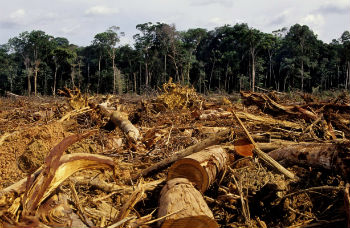A new study estimates that up to 30 percent of all deforestation in three Central American countries is due to cocaine trafficking, providing some much-needed data on the relationship between environmental damage and Latin America’s drug trade.
The study, published in the Environmental Research Letters journal, says drug trafficking could account for 15 to 30 percent of deforestation in Honduras, Guatemala and Nicaragua.
Unlike in South America’s drug-producing nations, where forests are typically cleared in order to sow coca, Central American drug traffickers often convert forests into pastures for money laundering purposes, the study states.
“As the drugs move north their value increases and the traffickers and cartels are looking for ways to move this money into the legal economy,” the report’s lead author, Steven Sesnie, told the Guardian. “Purchasing forest and turning it into agricultural land is one of the main ways they do that.”
Sesnie said that millions of acres have been deforested over the past decade using this method.
The authors used a “spatio-temporal analysis” to determine the link between cocaine flows and forest loss in a total of six Central American countries: Guatemala, El Salvador, Honduras, Nicaragua, Costa Rica and Panama. It found the strongest connection between drug trafficking and “anomalous forest loss” in Honduras and Nicaragua, and the weakest relationship in Guatemala and Panama.
The study represents the first broad-scale analysis of how drug trafficking, as opposed to drug cultivation, impacts deforestation, according to the authors.
InSight Crime Analysis
The study offers a rare quantitative analysis of how drug trafficking is a direct cause of environmental harm in Latin America. One academic study, published in 2014, similarly found that drug trafficking plays an important role in deforestation in Central America. The authors of the 2014 report found that traffickers cleared the land in order to build roads and clandestine airstrips, as well as to launder money.
But the relationship between organized crime and deforestation is not uniform throughout the region. Forest loss has been linked to coca growing in Colombia, the world’s largest producer of cocaine. In Brazil, by contrast, criminal organizations slash and burn forests in the Amazon in order to sell the land to ranchers and agribusinesses. Illegal logging is also big business in Brazil, accounting for as much as 80 percent of the country’s timber industry.
SEE ALSO: Coverage of Eco Trafficking
Weak government oversight and the enormous profits that criminal groups stand to gain from the exploitation of natural resources are the common threads that run through all of these cases. Brazil has recently loosened several regulations regarding forest conservation, likely making it even easier for organized crime groups to plunder the Amazon with impunity.

